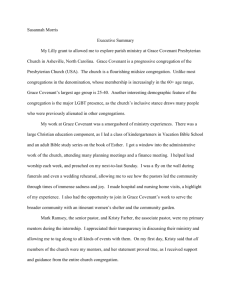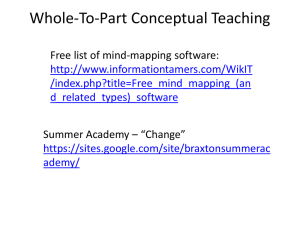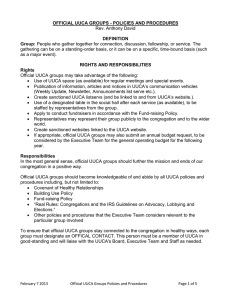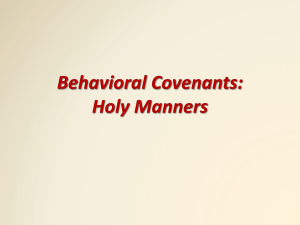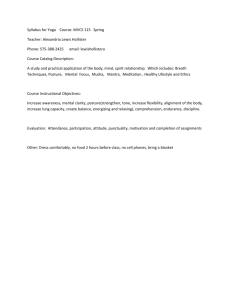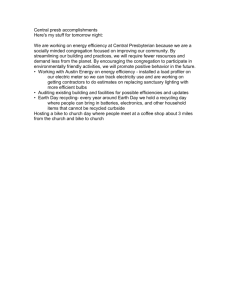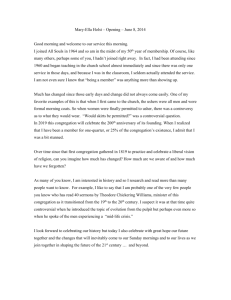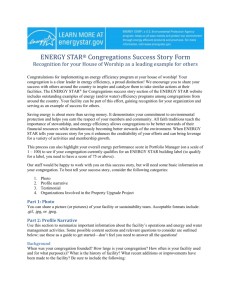Mission Covenant
advertisement
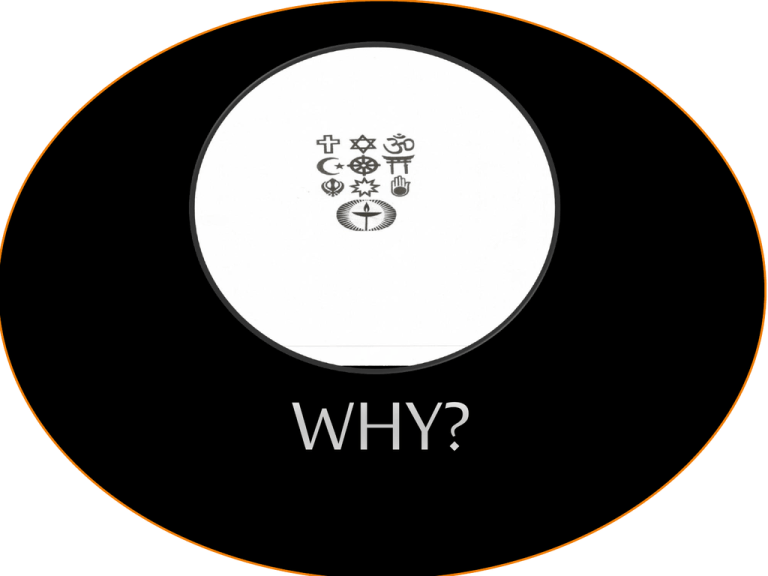
WHY? PRINCIPLE Mission is the sine qua non of all institutional success Covenant is an agreement about how a group will relate to achieve a common purpose WHY A MISSIONCOVENANT STATEMENT FOR A NON-CREEDAL RELIGION? ISSUES THE ISSUE OF THEOLOGICAL EVOLUTION THE ISSUE OF SOURCE OF AUTHORITY THE ISSUE OF POSTURE TOWARD TRUTH THE ISSUE OF MISSION FULFILLMENT Mission-Covenant Elements • • • • • Name of the people Statement of mission Source of authority Posture toward truth Covenant of fulfillment Value=provides boundaries and encourages brevity What does a mission statement provide for a congregation? A MISSION STATEMENT: • • • • • • Determines the leadership Defines the vision Focuses the ministry Shapes the organization Motivates the resources Prioritizes the agenda SAMPLE MISSION STATEMENTS Our mission is simple: To offer education on the wise use of credit - Springboard (non-profit credit management) The mission of the Foundation has been to improve the quality of life through a balance between technology and nature - Charles A. and Anne Morrow Lindbergh Foundation To combine aggressive strategic marketing with quality products and services at competitive prices to provide the best insurance value for customers - Aflac (Fortune 500) To provide an exceptional dining experience that satisfies our guest’s grown-up tastes by being “cut above” in everything we do - Arby’s To unlock the potential of nature to improve the quality of life - ADM (Fortune 500) To bring inspiration and innovation to every athlete in the world - Nike Our mission is to reach out to all in the community with the good news (Jesus is Lord and Savior) - Church of the Savior (Windsor, Ontario) WHY A NEW MISSION-COVENANT STATEMENT EVERY FIVE TO SEVEN YEARS? • Ritualistic numbing • Language obsolescence • Membership addition • Erosion of ownership Unitarian Universalist Confusions The inability to distinguish between symptoms and causes • Community • Social Action • Political Correctness • Covenant THE MOST COMMON TRAPS • Grounding the statement in present perspectives. • Failing to distinguish between mission and ministry – between ends and means. • Assuming the mission is up for grabs • Not looking at institutional origins PRIMAL ISSUE AND GRAND IRONY We have allowed individualism to triumph over community and enshrined this triumph in community. The mantra of this enshrinement is “unity in diversity”. The Trap of Individualism (members and congregations) the mission is up for grabs the mission is a smorgasbord to fulfill my personal needs the mission commitment depends on my personal satisfaction the mission is under minority rule A LAUNDRY LIST OF PREFERENCES OF MINISTRY THAT INDICATES THE TRIUMPH OF INDIVIDUALISM OVER COMMUNITY UNCHANGEABLE the mission CHANGEABLE: how the mission is stated within the historical context How the mission is stated is as important as what it is…consider: “Sitz im leben” Example: VENITIAN BLINDS versus LIGHT CONTROL Low Sense of Mission Converts to a Maintenance Mode • Navelization (focus) • Politicization (relationships) • Minimalizaton (resources) • Individualization (smorgasbord) • Stagnation (growth) A CLEAR AND COMPELLING SENSE OF MISSION WILL MEET THE DEMAND OF ANY ISSUE A CONGREGATION CONFRONTS CHURCH CONSULTANTS AGREE Powerful Growing Congregations Share Three Paramount Characteristics: A clear compelling sense of mission Church A cadre of leadership devoted to thisAgree mission Consultants above all other agenda An organization designed to facilitate this mission (a system) According to church consultants How do I know the mission of my congregation? That which gets the most energy is the mission CONSENSUS SEEKING REVIEW Asset: raises the outcome of the democratic vote Liability: easily converts to minority rule Attitudes • • • • Noncritical All are heard Open-mindedness Always an alternative • • • • Posture Active listening Think conceptually Use synonyms “What about…” “Would this work..?” “I’m wondering if…” SYNONYMITY to define religion Is to define its mission DESCRIPTION (Discovered 1994) 22 acres 12,000 years (older than Stonehenge, pyramids) Series of identical circular temples Built – then deliberately covered over Stones up to 18 feet high (ten to sixty tons) Canines, boar, ducks. lizards scorpions, cattle, crows, vultures, ants, etc. (elaborate as Byzantine art) Human and animal bones in pits (ceremonial?) FEATURES Obvious spiritual mecca Stone Age era: pre-writing, pre-wheel, pre-metal, pre-draft animals, pre-pottery (flint instruments) No evidence of housing, fire, utensils or workers habitation in the area Limestone and water three miles away Implied Revolutionary Meaning A sophisticated level of organized social construction in meaning-making. Institutionalized religion pre-dates the emergence of the agricultural settlement. Both community and religion came into being as survival mechanisms – physical and psychological. Society creates institutions to fill its needs. Assumption: The institutions that survive fill enduring needs Examples: financial educational political health economic the first institution was clanfamily All others invented to serve the needs of families Imagine a prehistoric scene a huge rock outside of a cave IMANGE a cave man on the rock as Rodin's thinker TABLE GROUP EXERCISE What need was society trying to fulfill when it created religion? Scribe report to larger group in one sentence. TABLE GROUP EXERCISE • What is the purpose of a religion’s “theology”? • Scribe report to larger in one sentence. TABLE GROUP EXERCISE Using the material from the prior two exercises….write a congregational mission statement in no more than twenty words Scribe to share If you are doing your mission You are going to grow spiritually and numerically and your problem will be how to accommodate all the excited people who want to invest in the nobility of social transformation. NO WIND BLOWS IN FAVOR OF THAT SHIP WITHOUT A PORT OF DESTINATION If you don’t know where you are going you are liable to end up someplace else. - R F Mager
